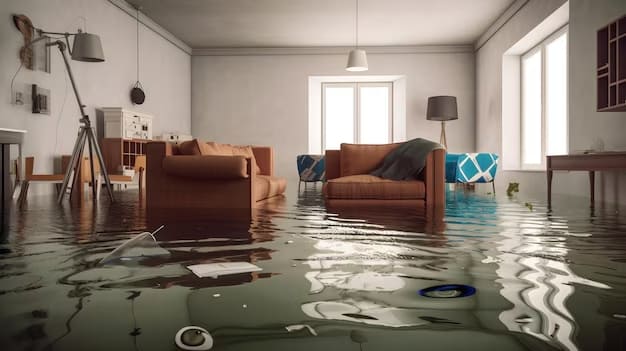Basement flooding can be a homeowner's worst nightmare, causing extensive damage to property and personal belongings. Knowing what steps to take when faced with a flooded basement can help mitigate damage and minimize stress. In this article, we'll explore essential actions to take if your basement floods, ensuring a prompt and effective response to this challenging situation.
What to do for basement flooding:
1. Turn Off The Electricity
Safety should always be your top priority. Before entering a flooded basement, turn off the electricity to avoid the risk of electrical shock. If you're unable to safely reach the breaker box, contact your utility provider for assistance.
2. Stop The Source of the Water (If Possible)
If the flooding is due to a burst pipe, malfunctioning appliance, or other identifiable source, try to stop the flow of water if it's safe to do so. Shut off the main water supply to your home or address the issue directly if possible.
3. Pump the Standing Water Out of the Basement
Using a sump pump or a wet/dry vacuum, remove the standing water from your basement as quickly as possible. The longer water sits, the more damage it can cause, so act fast.
4. Clean Salvageable Items and Remove Damaged Ones
Once the water has been pumped out, assess your belongings. Salvage any items that can be cleaned and restored, and dispose of irreparably damaged ones. Promptly removing wet items can help prevent mold growth and further damage.
5. Dry The Area
Thoroughly dry out the basement using fans, dehumidifiers, and natural ventilation. Pay special attention to areas that are prone to retaining moisture, such as carpets, drywall, and insulation.
6. Clean, Sanitize, Deodorize
Clean and disinfect all surfaces affected by the flooding to prevent mold growth and ensure a safe living environment. Use a mixture of detergent and water to scrub walls, floors, and other surfaces, then disinfect with a solution of bleach and water. Don't forget to deodorize the area to eliminate any lingering odors.
7. Call Your Insurance Company
Contact your insurance provider to report the flood damage and initiate the claims process. Be prepared to provide documentation, such as photos and receipts, to support your claim.
8. Call the Appropriate Contractor(s)
Depending on the extent of the damage, you may need to hire professional contractors to assess and repair the damage to your basement. This may include water damage restoration specialists, plumbers, electricians, and general contractors.

Conclusion:
Dealing with a flooded basement can be overwhelming, but knowing what to do can make all the difference in minimizing damage and restoring your home to its pre-flood condition. By following these essential steps and seeking professional assistance when needed, you can effectively manage a basement flood and protect your property and belongings. For more detailed guidance on handling a house flood, check out our comprehensive article on what to do when your house floods.
Frequently Asked Questions About Flooded Basements
Does insurance cover a flooded basement?
Homeowners insurance typically covers sudden and accidental water damage, such as a burst pipe. However, coverage may vary based on your policy and the cause of the flood. It's crucial to review your policy or consult with your insurance provider to understand your coverage for basement flooding.
How much does it cost to fix a flooded basement?
The cost of fixing a flooded basement can vary significantly depending on the extent of the damage and the necessary repairs. Minor issues like water extraction and drying may cost a few hundred dollars, while major repairs such as foundation damage or mold remediation can cost several thousand dollars. It's advisable to get multiple quotes from reputable contractors to assess the cost accurately.
How do you get rid of mold in a flooded basement?
Getting rid of mold in a flooded basement requires thorough cleaning and remediation. Start by drying out the area completely to prevent further mold growth. Then, scrub affected surfaces with a mixture of water and detergent or specialized mold cleaner. For extensive mold infestations, it's best to consult with a professional mold remediation service. They have the expertise and equipment to safely remove mold and prevent its recurrence.
How long does it take to dry out a flooded basement?
The time it takes to dry out a flooded basement depends on several factors, including the severity of the flooding, the size of the basement, and the effectiveness of the drying methods used. In general, it can take anywhere from a few days to several weeks to completely dry out a flooded basement.
Can I clean up a flooded basement myself, or should I hire a professional?
While it's possible to clean up a flooded basement yourself, it's often best to hire a professional water damage restoration company. Professionals have the expertise, equipment, and experience necessary to safely and effectively clean up and dry out a flooded basement, minimizing the risk of further damage and mold growth.
How can I prevent my basement from flooding in the future?
To prevent basement flooding, maintain clean gutters and downspouts, ensure proper grading away from the foundation, and seal any cracks in the walls. Install a sump pump with a battery backup, window well covers, and landscaping features to divert water. Regular home inspections and consulting with a professional can help.

